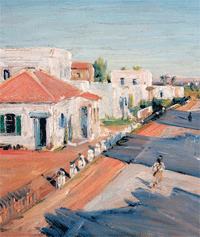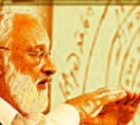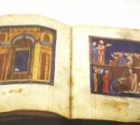
Light Me Up: The Beauty of Hanuka
William Kolbrener
The mitzva of the lighting of the Hanuka lamp,' says Maimonides, is a very beloved mitzva.' To encounter this passage on its own, you might forget that scholars like to call Maimonides a 'rationalist'. Instead we get here a rare expression of enthusiasm - not only an adjective, but even an adverb. There are 613 mitvos in the Torah, and many more decreed by the rabbis, but nowhere else do we find Maimonides showing such enthusiasm for a mitzva. We may wonder, adapting the idiom that my kids use when a sibling is evidencing too much enthusiasm for an activity - lama ata kol kach mitlahev? - 'why are you getting so excited?' or more literally, 'why are you so lit up?' Why is Maimonides so 'lit up' by the mitzva of Hanuka?
But there are other questions to which we'd have to attend as well. Continuing, Maimonides writes, 'a person should be careful so as to make known the miracle, and to multiply his thanks to G-d and praise him for the miracles'. Why is there a disagreement in number? Is it miracle or miracles? The inconsistency in Maimonides is paralleled by a seeming inconsistency in the sages. For example, when Talmud asks 'what is Hanuka?' - that is, on what basis was Hanuka established as a holiday? - the answer given is the miracle of the oil that should have lasted only one day, but lasted eight days instead. Yet in the prayers on the eight days of Hanuka, there is no mention of the miracle of the oil, only the miracles of Jewish victory against the Greeks - that the stronger and more numerous Greek forces succumbed to the weaker Jewish minority. So in the question of miracles - to Maimonides we ask, 'how many?', and to the sages, 'which one?'
The miracle of Hanuka - or the miracles - become clearer in relation to the Greeks and the particular threat they represented to the people of Israel. While the sages recognize that of all the nations of the world the Greeks have the greatest claim to wisdom, they associate the Greeks with the aboriginal darkness – the hoshech- from before the Creation. The Greeks with their decrees, our sages say, darkened the eyes of Israel. The means through which they brought about that darkness, as well as the response of the Jewish people, may provide a way into better understanding the miraculous nature of Hanuka.
The parallels - or better, the contrasts - between Hanuka and Purim help in explaining the distinctive nature of galut Yavan, the exile of darkness imposed on the Jews by the Greeks. On Purim, the Jewish people transgressed through attending the feast of the Persian King Achashverus. That is, they transgressed with their bodies, and as a result, the threatened punishment was to their bodies: Haman wanted to destroy all of the Jewish people. To avoid the threat against them - they appealed to G-d through fasting, again with their bodies. So when salvation came, the Jews celebrated with their bodies - with drinking and eating. In contrast, the transgression which leads up to the Hanuka story was the neglect of the service in the Temple. Because of this, the Jews were threatened not with destruction of their bodies, but of their souls. The Greeks had a consistent strategy: they did not destroy the oil; rather they defiled it, leaving its external form, though rendering it impure. So also, they left the Temple in Jerusalem standing, but transformed it internally, turning it into a gymanasia, a place celebrating the primacy of Greek wisdom. So the decrees of Antiochus were not against the body of the Jew: the latter retained his external form, but he, like the oil and the Temple, was defiled internally. The strange exile of Greece - the Jews still in their land - is the internal and spiritual exile of assimilation. So when salvation came after these trials, the Jews celebrated not through food and drink, but with thanks and praise to G-d.
Praise or hoda'ah is connected with hod, that is beauty. The kabbalists tell us that the eight days of Hanuka are eight days of hod; the days of Hanuka are days of both praise and beauty. Both words imply flexibility, even dependence - to praise G-d is to confess and recognize a reliance upon the divine. The beauty of hod defines itself through an acknowledged vulnerability, a yielding. The Greeks emphasized the beauty of the external form, yofi, but such beauty begins and ends with the external. Unlike the beauty of Greece, hod represents a beauty that comes about when the physical first joins and then yields to the spiritual. Hod is a beauty that breaks forth from the physical, yielding to a force beyond it.
Here is the beauty of Hanuka - in the hod of the Hanuka lamp, burning for eight days. Ask Aristotle how long the lamp will burn, or ask Newton - they will both tell you: one day. The lamp that burns for eight days testifies to a force beyond both the Aristotelian laws of physics and the Newtonian laws of nature. As great as their wisdom was and is, they darkened our eyes, habituating us to a world in which there is nothing more than the laws of nature - a world exhausted by the empirical and defined by the expression 'seeing is believing.'
When Maimonides tells us to be careful to make the miracle (in the singular) known - this is the miracle of the oil burning for eight days – he may emphasize that I need to make the miracle known not only to others, but to myself. To recognize the hod of the Hanuka lights which testify that nature is flexible; it bends; it yields. First comes the acknowledgement of the hod of the Hanuka lamps, then the hoda'ah or praise for the miracles (in the plural) of the Jewish victory. The Hanuka lamp is acknowledged as a miracle in and of itself, but it also provides a lens through which to see the other miracles. The wars between Jews and Greeks can be reduced to a history book example of geopolitics - and they are by the Greeks. But the hod of the Hanuka lamps leads to the hoda'ah or praise for the miraculous nature of the everyday - starting for us with the Jewish victory over the Greeks, but leading outward to the other miracles of our lives. The mitzva of the Hanuka lamps is because it allows us to thus find light - even hod - in the darkness of Greek exile. Acknowledging the hod of the lamp activates praises and thanks for the miracles that are less easily seen in a world where the Greeks have darkened - and may still succeed in darkening - our eyes. So Maimonides gets 'lit up' by the lights of Hanuka. G-d transformed the oil of the lamp. And through the lamp - if we see the hod - the world may also be transformed.
 DEAR EDITOR 152
DEAR EDITOR 152 TIDBITS, COMMENTS AND ODDITIES-152
TIDBITS, COMMENTS AND ODDITIES-152 TAKE IT LIKE A SOLDIER - A MEMOIR - A Review
TAKE IT LIKE A SOLDIER - A MEMOIR - A Review Kabbalah For All
Kabbalah For All Haggadot
Haggadot Passover 5767 ...The Holiday of Freedom
Passover 5767 ...The Holiday of Freedom William Kolbrener
William Kolbrener